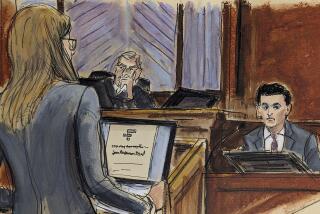U.S. Rests Its Case Against Quattrone
- Share via
NEW YORK — Federal prosecutors rested their case Wednesday against Frank Quattrone, declaring that their evidence proved that the former Silicon Valley financier tried to impede government investigations when he told underlings to destroy documents.
The trial’s most pivotal testimony could begin today when Quattrone is expected to take the stand to tell why he sent his staffers a two-line e-mail on Dec. 5, 2000, advising them to follow another banker’s e-mail suggesting they clean up files.
After the prosecution rested, Quattrone’s lawyers asked U.S. District Judge Richard Owen to acquit him of two counts of obstruction of justice and one of witness tampering.
Owen quickly rejected the motion, and prosecutors said there was “substantial circumstantial evidence” that the e-mail was meant to stymie two probes into how Credit Suisse First Boston, Quattrone’s then- employer, handed out initial public stock offerings to clients.
The government ended its presentation by calling Gary Lynch, CSFB’s top lawyer, who said Quattrone told him in January that he had not known there were regulatory probes when he sent the e-mail.
“It was a matter-of-fact, unqualified statement that he was not aware of the investigations,” Lynch told the jury during the seventh day of the trial.
The government has charged that Quattrone knew about the probes by the Securities and Exchange Commission and a federal grand jury and understood the need to keep all files.
“The defendant was repeatedly advised about the existence of the investigations,” government lawyer Steven Peikin said.
Quattrone, 47, claims he did not believe that the probes targeted him because they focused on how IPOs were distributed to clients, a job his lawyers say was handled by another department.
Lynch’s testimony appeared designed to discredit Quattrone by suggesting that he lied to his bosses. Combined with that of a former CSFB lawyer on Friday, it was the most damaging testimony against Quattrone.
That lawyer, David Brodsky, said he told Quattrone that the financier could become involved in a grand jury probe only hours before he sent the e-mail advising staffers to clean up files.
Defense lawyers Wednesday called Richard Char, who wrote the Dec. 4 e-mail that Quattrone encouraged his staff to follow. Char said the e-mail was his idea and not suggested by Quattrone.
A central defense argument is that CSFB’s legal department did not issue a broad directive to Quattrone’s technology banking group to stop following CSFB’s document-retention policy until after Quattrone sent his e-mail. The directive was sent more than two weeks after the company received a subpoena from investigators.
The policy ordered employees to discard many documents once IPOs were completed to keep investor attorneys from getting hold of them during lawsuits.
In other words, the defense appears to be arguing that Quattrone did nothing wrong when he told his employees to discard documents because he had not been told to keep them.
However, under cross-examination by prosecutor David Anders, both Char and John Hodge, a top CSFB financier and longtime Quattrone friend, said the policy required employees to keep documents if subpoenas had been issued.
Anders was attempting to demonstrate that the policy indeed was in effect -- but that it required Quattrone to preserve, not destroy, documents.
Quattrone faces a maximum of 25 years in prison if he is convicted on all counts, although he probably would be sentenced to considerably less under federal sentencing guidelines.
More to Read
Inside the business of entertainment
The Wide Shot brings you news, analysis and insights on everything from streaming wars to production — and what it all means for the future.
You may occasionally receive promotional content from the Los Angeles Times.










